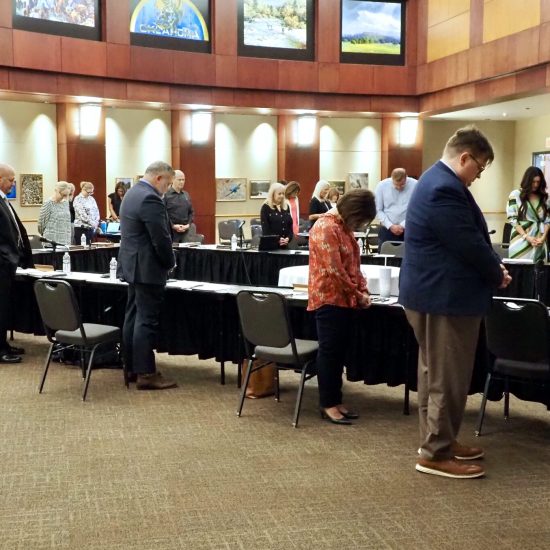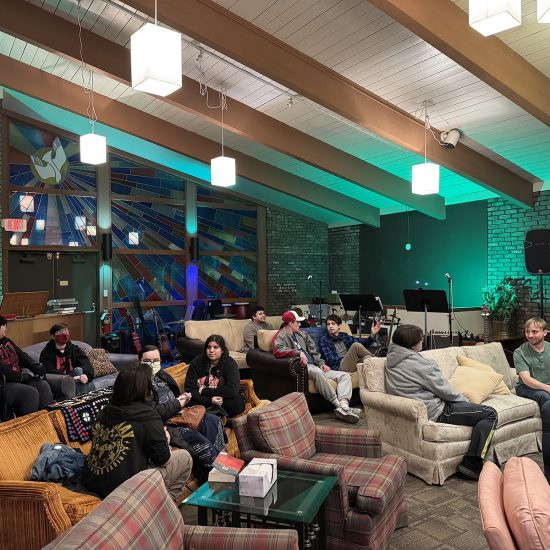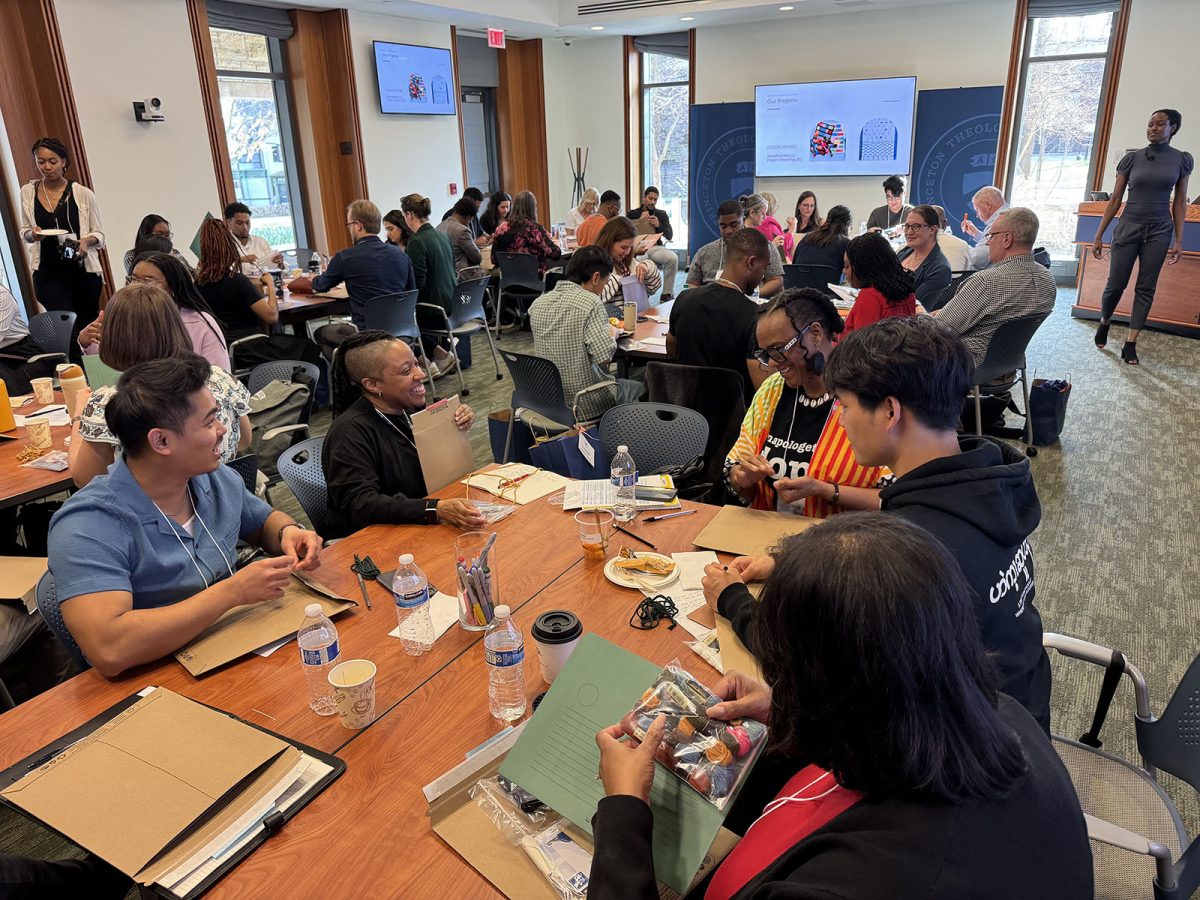
PRINCETON, N.J. (RNS) — On a Tuesday evening in early April, an audience sat enraptured in Princeton Theological Seminary’s dining hall as, one by one, adults in their 20s walked up to a platform, took the microphone and shared a story.
“I realized that if God made our bodies this intricate, shouldn’t the care we give others be just as intricate?” Jewel Koshy asked.
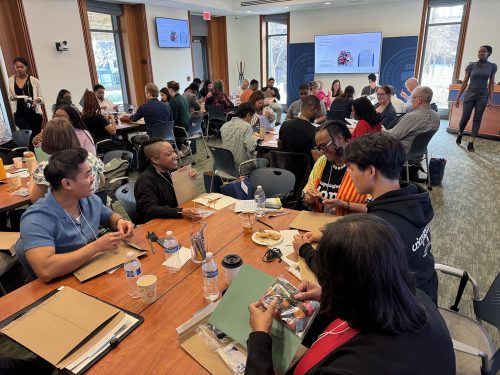
Participants of the Polaris Leadership Summit for young Christian leaders work on projects together at Princeton Theological Seminary in early April 2025, in Princeton, New Jersey. (RNS photo/Kathryn Post)
“I allowed Jesus to look at me, and I looked at him, and my life was completely transformed,” Betty Freymann said.
“How can we stay inquisitive in a world where excellence is expected and assimilation is often rewarded?” Ray’Chel Wilson asked. “For me, I take my questions to God.”
Despite the setting, the young adults speaking weren’t seminarians: They were entrepreneurs, nonprofit leaders, health care workers and other professionals at a summit as part of the Polaris Young Adult Leadership Network, a new initiative from Princeton Theological Seminary that aims to equip young Christian leaders to find their calling beyond parish ministry.
“If you lead in the public sector, if you are an artist or a business leader or an educator, and you’re deeply motivated by your Christian faith, we think theological education has something to offer there as well,” said Shari Oosting, project director of the Polaris Network.
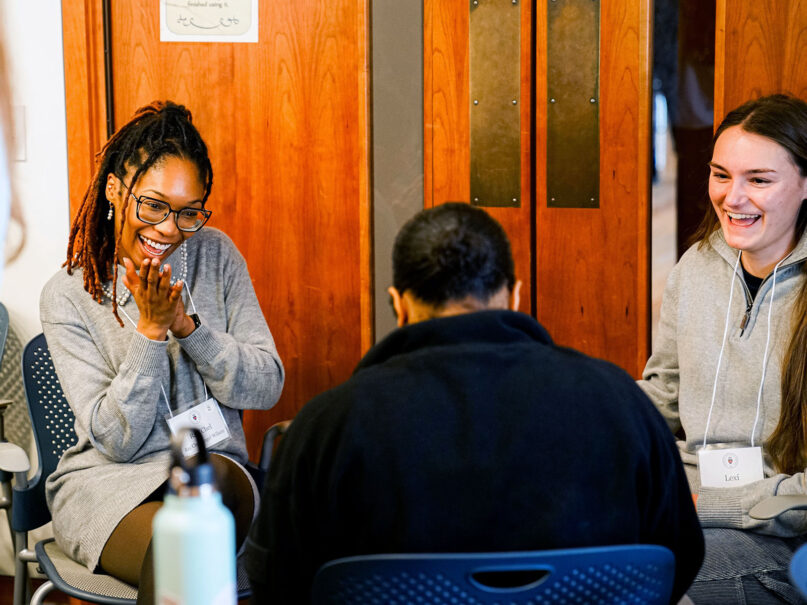
Ray’Chel Wilson, left, mingles with other Polaris Leadership Summit participants on the campus of Princeton Theological Seminary in early April 2025, in Princeton, New Jersey. (Photo by Raygen Samone Brown for Princeton Theological Seminary)
In recent years, many U.S. seminaries have faced existential threats fueled by the COVID-19 pandemic and a changing religious landscape. As organized religion continues to fade in popularity among many Gen Z, some seminaries are downsizing, combining and embracing online and hybrid models. They are also evolving, offering different certificate programs or degrees tailored for non-clergy students. Some seminaries target retired or second-career students, while others refuse to give up on young adults, instead designing programs to help them live out their spirituality beyond seminary walls.
Freymann, 28, a Dallas-based tech consulting manager and a participant at the Polaris summit, said meeting other Christians doing “the Lord’s work” in the secular world has made her feel less alone.
“I love that we’re pushing to form Christian leaders. Not Catholic, not Presbyterian, not Episcopal leaders, but Christian leaders,” said Freymann, who is Catholic and hosts a Spanish-language podcast for Latino Catholics.
That Monday (March 31), Freymann gathered in the seminary’s library with roughly 30 other young adults. The room was abuzz as participants responded to discussion prompts, wove strands of yarn for an interactive art project and heard a lecture about the church in the modern world. Throughout the summit, each shared eight-minute personal stories about Christian leadership in groups or at the final storytelling festival.

Kennedy Maye at the Polaris Leadership Summit in early April 2025, in Princeton, New Jersey. (RNS photo/Kathryn Post)
“Something that really stood out to me is the fact that everyone is a young adult,” said participant Kennedy Maye, a 22-year-old psychology major at the University of Kentucky. Raised as a nondenominational Christian, she often discusses God with other young adults in her life but said she often finds herself “defending God.” Here, it was different.
Launched in 2023 with a $4 million grant from the Lilly Endowment, the Polaris Young Adult Leadership Network convenes these cohorts while also offering sub-grants to fund their local ministry efforts and provide workshops on topics like mental health, vocational discernment, and sustainability. The aim is to combat isolation among young Christian leaders and counteract the narrative that all young people are losing their faith.
“In a lot of ways, these young people are teaching us how to be a seminary for the next generation,” said the Rev. Kenda Creasy Dean, the Mary D. Synnott professor of Youth, Church and Culture at Princeton Theological Seminary and one of the architects of Polaris.
Built to train pastors, many seminaries like Princeton are increasingly welcoming students looking to discern their calling rather than intending to work at a congregation. Dean said she has observed that pastoral credentials don’t have the draw they used to for students, which is mirrored in trends at the seminary.
While enrollment in its Master of Divinity program — a prerequisite for many seeking ordination — has declined in recent years (down to 155 students in the 2024-2025 school year, from 245 students in 2020-2021), Princeton’s master’s programs for leaders interested in theology/sustainability and in justice/public life have grown steadily since being launched in 2023. The seminary has also seen growth in part-time, hybrid, and online offerings. And this year, it saw the largest incoming class of degree-pursuing students in the last five years.
According to data from the Association of Theological Schools, an umbrella group of over 270 schools, Princeton isn’t alone. Though enrollment in Master of Divinity programs continues to decline among ATS member schools, down roughly 14% since 2020, that dip has been offset by boosts in two-year, often customizable Master of Arts programs and non-degree enrollment, leading to an overall 1.8% increase in enrollment at ATS schools since 2020.
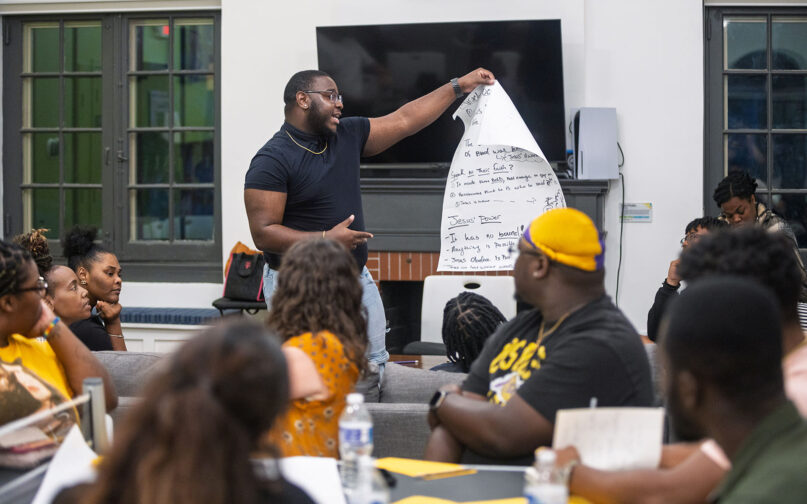
Young Adults Bible study at the Mosaic Hub on July 26, 2023, in North Chicago. (Photo courtesy Mosaic Ministries)
Still, seminaries are facing significant challenges. As a result, Trinity Evangelical Divinity School, an influential Evangelical Free Church school near Chicago, announced last month it will be acquired by a Canadian university and move to British Columbia.
Despite financial setbacks, the school has had a transformative impact on the nearby city of Waukegan, Illinois, thanks to a young adult-centered program called Mosaic Ministries. As part of another Lilly Endowment-funded endeavor, Mosaic Ministries began collaborating with 12 Waukegan churches in 2010 to develop their ministries with the input of young adults. By listening to what young people asked for — space to ask hard questions and do life together, not just host another barbecue, for example — churches adapted.
“As the years went by, our churches grew healthier, they grew more intergenerational, they grew more missional, and this collaboration of churches shifted from individual churches to a network,” said the Rev. Daniel Hartman, co-director of Mosaic Ministries at Trinity Evangelical Divinity School.
In 2022, that network came together to form Refined, a program for young adults from each of the 12 churches. Across 18 months, the young adults received mentoring, attended retreats, and became involved in Waukegan-based community projects.
Though Adi Camacho grew up attending a Baptist church in Waukegan, she joined Refined after several years away from the church.
“It was my first time getting to meet brothers and sisters who were not from my congregation that could hear my heart and be there for me and love and support me in such a godly way,” Camacho said. “We were able to break barriers between our churches.”

Children participate in a Waukegan community cleanup as part of Mosaic Ministries in Waukegan, Ill., in 2022. (Photo courtesy Mosaic Ministries)
Camacho hosts a podcast about Mosaic Ministries’ impact and pitches the program at citywide events like cleanup days, toy drives or prayer services. The city routinely looks to Mosaic to meet local needs, and Mosaic’s hub, a revamped former library, is a gathering place designed to welcome young people who might be hesitant to meet at church, said Hartman.
It’s not yet clear how Mosaic Ministries will be impacted by the seminary’s move. However, Mosaic and similar innovative seminary initiatives take a unique approach to empowering young people in their own contexts, without trying to convince them to enroll as students. For example, Austin Presbyterian Theological Seminary in Texas has created programming for both Christian and “Christ curious” young adults.
“There are all kinds of places where young adults gather at the edges of Christian conversation,” said Melissa Wiginton, vice president for strategic engagement and partnerships at the Austin seminary. “We know that there is a longing out there for people to be connected to something that’s sturdy enough to hold them, but not so rigid that it encages them.”
Since 2017, the seminary, also with the help of the Lilly Endowment, has created such spaces via its 787 Initiative, which offers faith and community engagement for young people in Austin. Mercedes Collins, who runs a recreational club, We Outside ATX, for Austin’s Black community, provides input for 787’s advisory council. She said young people in her network are craving spaces where their voices are heard.
“Community is a spiritual thing, right?” said Collins, who identifies as more spiritual than religious. “We’re not meant to be here alone.”
787 was a precursor to the seminary’s Austin Story Project, which launched in January and will offer an in-person storytelling cohort and spiritual pilgrimages for young adults. The first pilgrimage will focus on nonviolence, where participants will visit sites connected with nuclear weapon production in the Pacific Northwest. A survivor of the bombing of Hiroshima will accompany them.
“Everybody’s in a massive period of experimentation,” said Dean, of Princeton Theological Seminary. “Desperation is a spiritual gift, and so it gives you a chance to experiment with things that, you know, 10 years ago were off the table. That’s happening everywhere, and we are no different in that.”
Religion News Service receives funding from Lilly Endowment.




